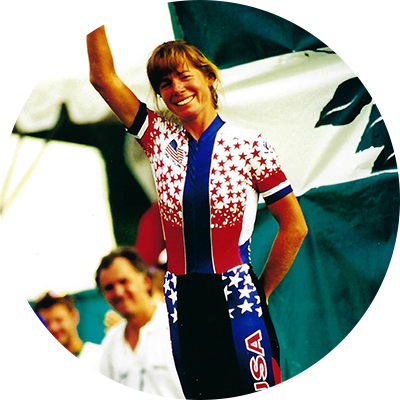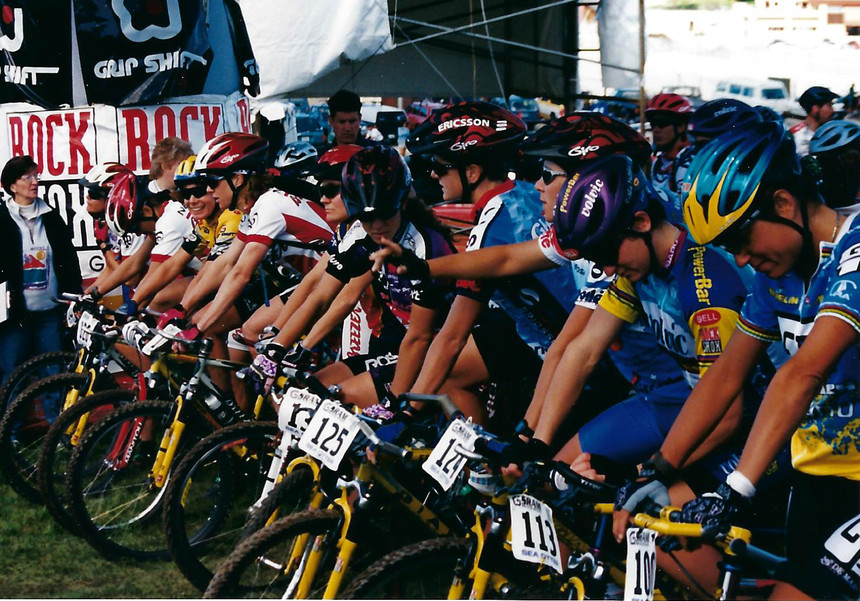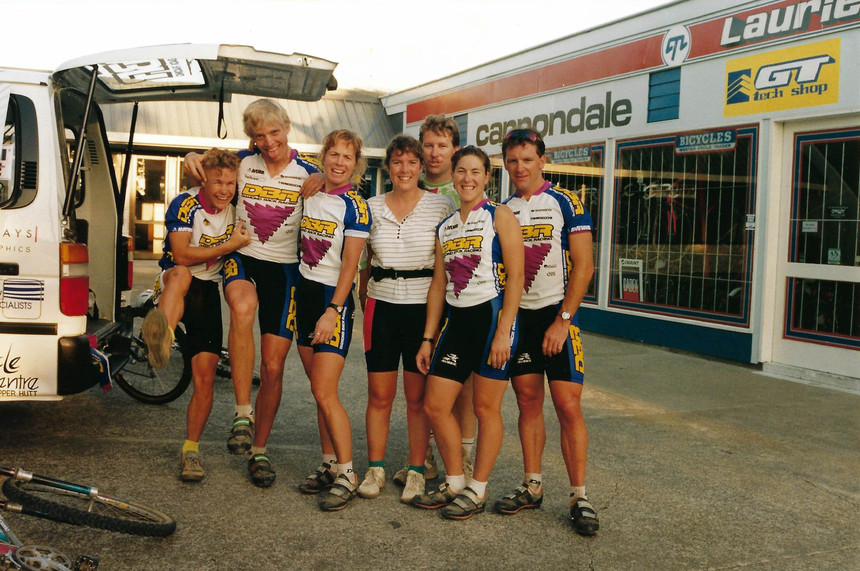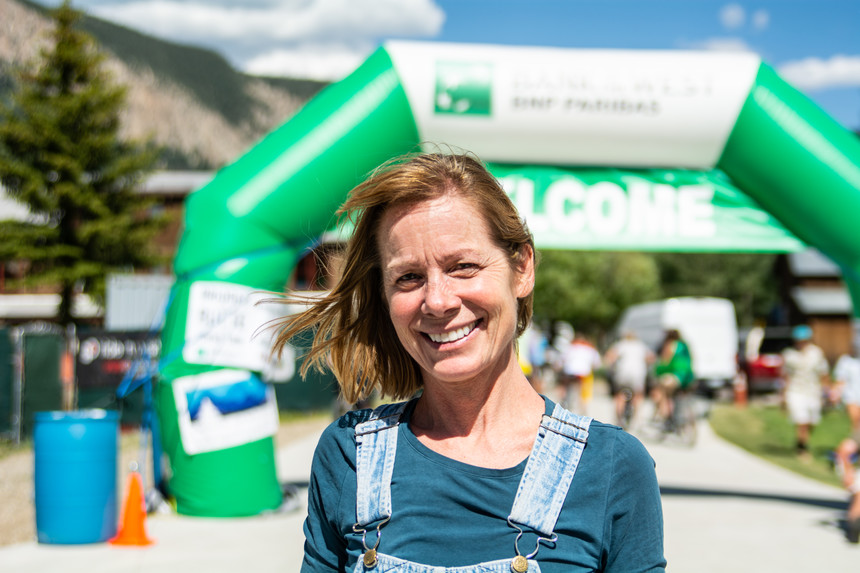
Shifting Gears: The Olympian
Story by Max RitterI first met Susan DeMattei, of all places, at a mountain bike race. Except she wasn’t racing. Her son Cooper had just finished his final lap at Crested Butte’s infamous Fat Tire 40 cross-country race, and she was there to cheer him and his friends on.
Of course, DeMattei was no stranger to this, having been on many a podium herself, culminating in an Olympic win in 1996. Wait, mountain biking in the Olympics? Yup, and DeMattei proudly took the United States Women’s Team to a bronze-medal finish in Atlanta.
While mountain bikes, apparel, and trailbuilding may have vastly changed since then, one thing hasn’t: the spirit of mountain biking. When Susan DeMattei first started riding bikes in the late 1970s, it was still a fledgling sport, something that offered freedom in a way nothing else could. Growing up in Marin County in the 70’s, she was right in the epicenter of a brand new sport. As the sport grew, so did she. Spending time on two wheels covering ground in the mountains was her favorite thing to do, and it still is.
These days, DeMattei lives in yet another mountain-bike crazed area: Gunnison, Colorado. Just down the road from its more famous neighbor, Crested Butte, the small city at the foot of the Elk Mountains still embraces the sport just as it did nearly 30 years ago. With hundreds of miles of singletrack, and a hard-charging yet laid-back local community, it’s the perfect place for her.
The Roots
For anyone who has ever bothered to research the history of mountain biking, all roads lead back to Marin County, California. The nature-loving county just north of the Bay Area, home to Muir Woods, seemed the perfect breeding ground for a sport like mountain biking: fun-loving, open-minded locals with a taste for the outdoors. However, read a few lines deeper into the history of the sport, and you will soon learn that the mountain bikers were in fact the pirates, the rebels, the unwanted members of the community. After a few years of progressing their new sport, they were forced to look elsewhere.

While DeMattei was exposed to this culture from an early age, it was not until attending college in Chico, California that she really began to embrace the sport. “I did not do anything in high school, I was a total vegetable. My brothers and sisters were all really athletic. And I don’t think it was because I wasn’t athletic, I was just lazy, and kind of more into boys and partying and all that stuff.”
The community she joined in Chico was already heavily focused on road cycling, and mountain biking was just coming into its own. DeMattei says: “I started dating a boy who was on one of the first mountain biking teams in the country, so I’ll admit to the same old tired story of ‘my boyfriend was doing it, so I did it too,’ but it was a great way to get into it at the time!” When she graduated from nursing school, she stayed in Chico for a few years and decided to try her hand at the whole racing thing. After winning some money at a race, she realized there was something to it, and pushed deeper into her new passion. Slowly, she picked sponsor after sponsor, but was still never actually planning on becoming a mountain bike racer. She had studied for a career in nursing, and that was the track she planned on taking in life.
“All of a sudden I did do enough races and had some results to where people started saying they could pay me as much as I would make as a nurse,” says DeMattei.
So I thought ‘Wow, it would be dumb not to do that!’ and took advantage of it.

At the time, DeMattei says, being a woman in the sport was not such an anomaly. The sport was on the fringe, so everyone kind of fit in somewhere or somehow. “You were definitely a bit of a tomboy if you mountain biked, and that kind of drew me to it,” she says. In most races, women were racing the same course and distance. However, as is still often the case today, prize and sponsorship money was nowhere near equal. It did not immediately bother her, however, and she found races that did in fact pay equal. Outside of just racing, she found a solid group of female riders to train and ride with, many of whom are still close friends today.
The Podium
Once DeMattei saw racing as more than just a hobby, she began to take it very seriously. Chico provided a great community, but it was not an ideal place for training. So, she picked up her life and moved to the mountains around Truckee, California, where she could take advantage of the altitude and advanced terrain. There, she picked up her first real bike sponsor, Diamondback Bikes, which allowed her to push past competing just on national level. The burgeoning World Cup scene had drawn her attention, and now she had an opportunity to join the best racers in the world on an international stage.
“The Euros were awesome to compete against, they of course already had a strong cycling culture, and once they jumped into mountain biking, they crushed,” says DeMattei. While mountain biking had been an American sport for years, European racers certainly held their own in the rankings. The growing international community, especially when it came together at the inaugural World Championships in Durango, Colorado in 1991, gave the new sport a huge amount of legitimacy.
With that newfound recognition, the International Olympic Committee began to take notice. The explosion of the sport all over the world caught the attention of the IOC, and towards the end of 1994, things were shaken up. “They were saying, ‘hey how do we spice things up, so people are more interested past the cycling facets of the sport,’ and they removed the team time trial to make room for mountain biking,” says DeMattei. At that point, she was already 30, and with her career winding down, she was not sure about her place anymore. However, with a title on the line, she could not resist and found herself on the hunt for one of two American female spots to represent the US on home turf at the Atlanta Olympic Games.

DeMattei and Juli Furtado made the cut. Furtado had retired from the US Ski Team to pursue a career in mountain biking and won five national titles before going on to start Juliana Bicycles, the first women’s mountain bike brand. To DeMattei, Furtado was both an idol and her biggest competitor, and she was stoked to have her as a teammate. Even under immense pressure, DeMattei tended to keep her calm, especially when she knew it was really just another ride with friends, albeit on a bigger stage.
A far cry from modern XC courses, DeMattei recalls that the 1996 Atlanta course actually shared the same space as the equestrian venue. It was a made-for-TV course, designed to get spectators amped on a sport they probably had never heard of before.
It was really fun, but one thing was for sure: it wasn’t mountain biking.
However, that did not make the race easy. “What made it hard was that the best competition was there. I don’t care if it’s a flat street, if the best racers in the world are there, it immediately becomes the hardest race in the world,” says DeMattei.
The day of the event was incredibly hot, and the Atlanta sun beating down overheard took its toll on the racers. She recalls crashing just 100 yards after starting, but quickly found her pace and felt better lap after lap. As the race wore on, she found herself in third place with a Norwegian racer, Gunn-Rita Dahle, right on her tail. Rounding the final corner, DeMattei knew she had nothing left in the tank, but Dahle had dropped far behind. She rode over the finish line to a cheering crowd proud to see an American on the podium. A bronze medal was something to be proud of, and the fact that she was 33 and part of the first women’s crew to podium at the Olympics felt even better.
Do I Retire?
After Atlanta, DeMattei felt like she wanted something more from life than just racing mountain bikes. Looking back, her age was not the limiting factor. Considering that many of her fellow racers still place top 10 in World Cups today, being 33 meant she was likely still in the prime of her career. “I love it that my friends from back then are still competitive, but I was just ready to start a family and focus on that,” says DeMattei.
She had recently gotten engaged to fellow pro mountain biker Dave Wiens. Wiens is perhaps best known for winning the infamous Leadville 100 race six times in a row, including defeating Floyd Landis and Lance Armstrong in 2008. The two started the next chapter of their lives together in Gunnison, raising three sons in the alpine paradise that is the Elk Mountains and focusing their attention on the many other aspects of the sport.
While her husband still actively raced, DeMattei focused on being a mom, working as a nurse, and spending her free time coaching bike skills in the area. She remembered the feeling of satisfaction and freedom she got from riding in her youth and immediately recognized it in the riders she coached.
I love people that enjoy the sport for what it is, whether it’s stress relief, smiles, socialization, or just being outside, it gets you to the most beautiful places!

She wanted to share the confidence she gained from racing at a high level with other women. The Tuesday night group rides she organized at the local Hartman Rocks trail system were all about building skills and confidence. “At first when I was racing, I was very uncomfortable in my own skin, not very confident, but I see women all the time out there racing or even just new to cycling that realize that they’re ok, they’re alright, and it really makes me smile.”
The Tuesday night rides would attract dozens of local women, spanning across all ability levels. Moms would bring their daughters, they would bring their friends, and everyone would have a great time. It even provided Demattei with a new chance to learn something new on a bike. As an XC racer, she admits, technical descents scared her, so she avoided them whenever possible. These days, she still appreciates a good burn, but loves fast flowy descents more than anything else. With hundreds of miles of descending in nearby Crested Butte, and a world-class bike park at the ski resort, she has quite the playground to work with.
What’s Next?
Now that her kids are almost done growing up, DeMattei is again facing the prospect of what to do next. Her son Cooper, now 20, is in college in Durango and has found a new love for riding bikes. “The thing I’m loving right now is that my son, who was totally reticent to riding in high school because he was a runner, is now embracing the sport like my husband and I did,” says DeMattei.

Back at the Fat Tire 40, Cooper comes over to join us after waiting for his friends to finish their race in Crested Butte. He has huge smile on his face, and his mom probably has an inkling as to why. “Mom I got fourth place today!”
To her, the racing isn’t even the important part, but is sure nice to see. More importantly, she is happy to see that he has discovered something on his own that brought her so much joy over the years. And the fact that that something is a healthy way to spend time outside with friends is the best part. Her outlook on the future is simple: keep doing what makes her and her family happy, because why change something that works so well?
